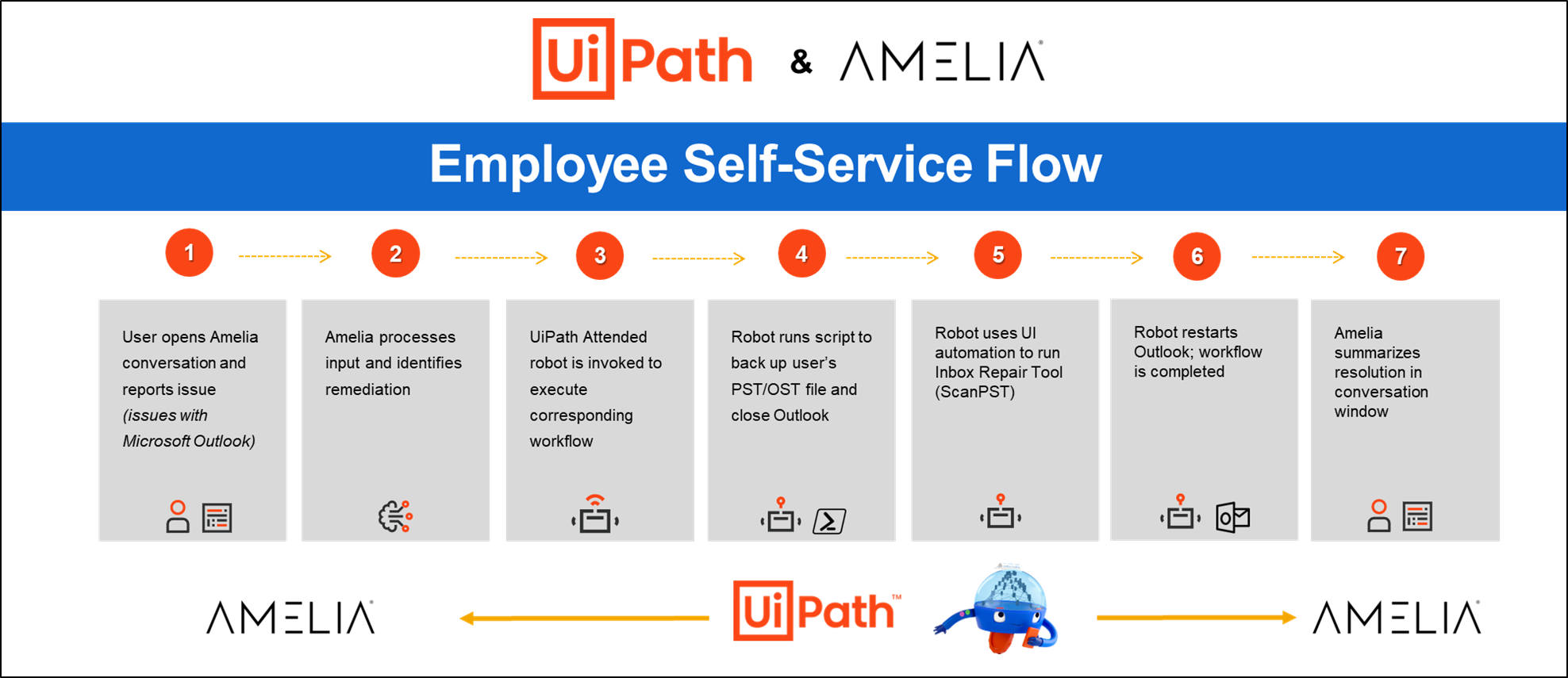Conversational AI + automation: Transforming the IT service desk employee experience
Share at:

The concept of chatbots dates back to the mid-1960s when Joseph Weizenbaum created ELIZA, a simple rule-based system that mimicked human conversation. Since then, advancements in natural language processing (NLP) and machine learning (ML) have led to the development of conversational AI. These systems enable the creation of chatbots and virtual assistants that can understand and respond to human language in a natural and intuitive way.
Today, conversational AI is widely used in customer support, sales, and employee interactions. Transforming customer engagement, increasing sales, reducing costs, and improving the quality of support interactions for customers and employees are some key benefits of deploying conversational AI. The technology is essential for intelligent automation in enterprises and is used in various fields, including customer service, e-commerce, healthcare, banking and financial services, and human resources (HR). Moreover, when it comes to IT service management (ITSM), conversational AI plays a vital role in enhancing overall efficiency. For example, conversational AI can be deployed for:
IT help desk interactions: providing quick assistance for common IT issues
Incident reporting: detecting and resolving IT incidents automatically
Service requests: handling hardware/software procurement and access provisioning
Q&A: providing end users with access to troubleshooting guides and FAQs
Overall, conversational AI improves efficiency, reduces costs, and provides better experiences for stakeholders.
Introducing conversational AI + automation
The recent UiPath and Amelia partnership ushers in the next generation of automated digital agents for employee help desks.
Amelia, a recognized enterprise leader in conversational AI, uses a combination of ML and NLP to understand the intent of user queries and generate accurate and relevant responses. The results of these conversations can be actioned through agents augmented and supported by the UiPath Business Automation Platform, enabling the end-to-end automation of help desk processes.
Native integration between UiPath and Amelia delivers best-in-class conversational AI and business automation capabilities. The capability allows employees to self-serve requests like desktop troubleshooting, explanation of benefits, and reset access for locked-out users. All thanks to Amelia’s advanced intent recognition and UiPath Robots, which can fulfill requests across cloud, on-premises, and desktop apps, as well as offline processes including documents and emails.

In about 25% of cases, Amelia will understand the intent and fulfill the request by triggering an API call or a UiPath Robot. This way, employees get to outcomes quicker, allowing them to be more productive and satisfied with the help desk service. What’s more, agents have more time to focus on complex cases which require a human touch and more in-depth problem solving.
In cases where a call or chat requires the help of an agent, Amelia and UiPath collaborate to enhance agent productivity by proposing optimal actions, summarizing calls, taking notes, and performing follow-up actions. This boosts IT help desk agents' efficiency, allowing them to handle more employee requests with greater effectiveness.
Industry-specific value of an intelligent IT service desk
The IT service desk plays a critical role in all industries, but depending on certain policies and requirements can have additional benefits—especially in industries such as banking and financial services where data security, efficiency, and compliance are of critical importance.
For example, a bank employee might need assistance with accessing a restricted financial database file or require permission to use specific software for financial analysis. Amelia can seamlessly handle such requests by understanding, in natural language, the employee's needs, verifying their credentials, and triggering the appropriate UiPath automation to grant the necessary access.
Another instance where this integration can be particularly useful is in maintaining compliance with financial regulations. Both Amelia and UiPath offer low-code development so the solution can stay up-to-date with the latest regulatory requirements and assist IT service desk agents in ensuring all necessary security protocols and software updates are implemented across the organization.
Additionally, financial institutions can leverage Amelia's capabilities to provide real-time IT support to employees working on critical transactions or dealing with sensitive customer data. For instance, if an employee encounters technical difficulties while processing a high-value transaction, Amelia can quickly diagnose the issue and trigger a UiPath automation to resolve it, ensuring minimal disruption to the employee's workflow.
By incorporating automation and Amelia into their IT service desks, banks and financial service organizations can not only improve their support operations but also enhance data security, compliance, and overall employee satisfaction in a highly regulated industry.
Elevate your IT service desk now
UiPath customers can now purchase a self-serve help desk solution with an Amelia Digital Agent inside directly from UiPath, allowing every employee to have access to an Amelia help desk agent for their help desk requests.
Thinking of automating conversational processes? Learn more about the integration of UiPath and Amelia.

Industry Practice Director, IT Automation, UiPath
Get articles from automation experts in your inbox
SubscribeGet articles from automation experts in your inbox
Sign up today and we'll email you the newest articles every week.
Thank you for subscribing!
Thank you for subscribing! Each week, we'll send the best automation blog posts straight to your inbox.



